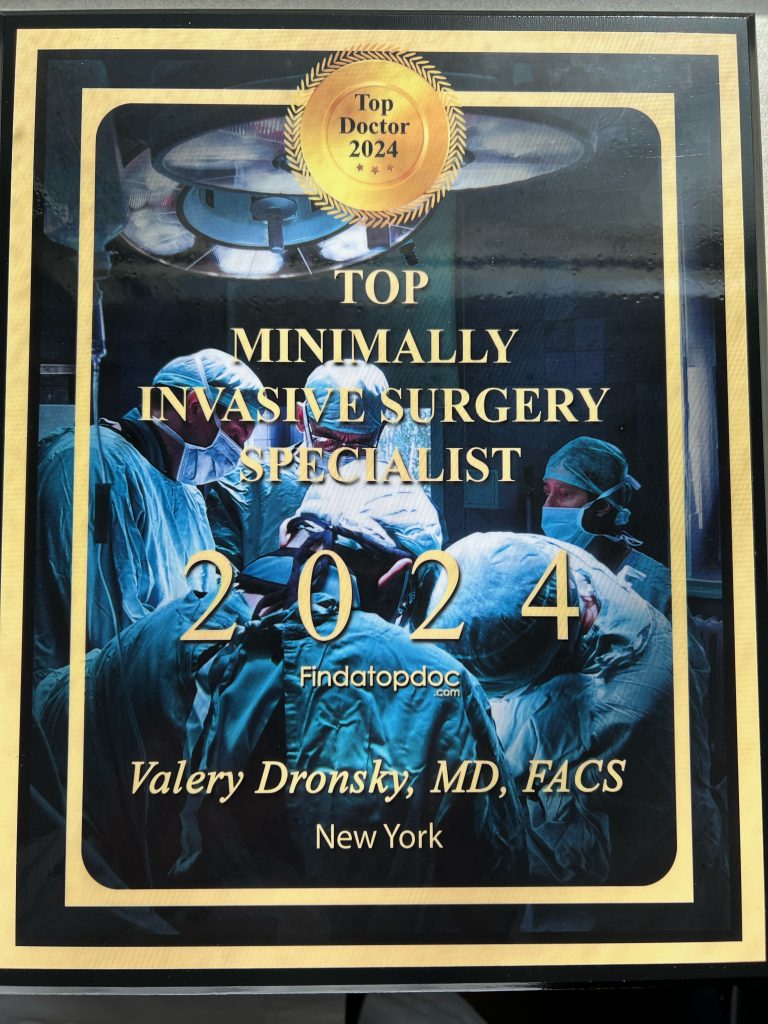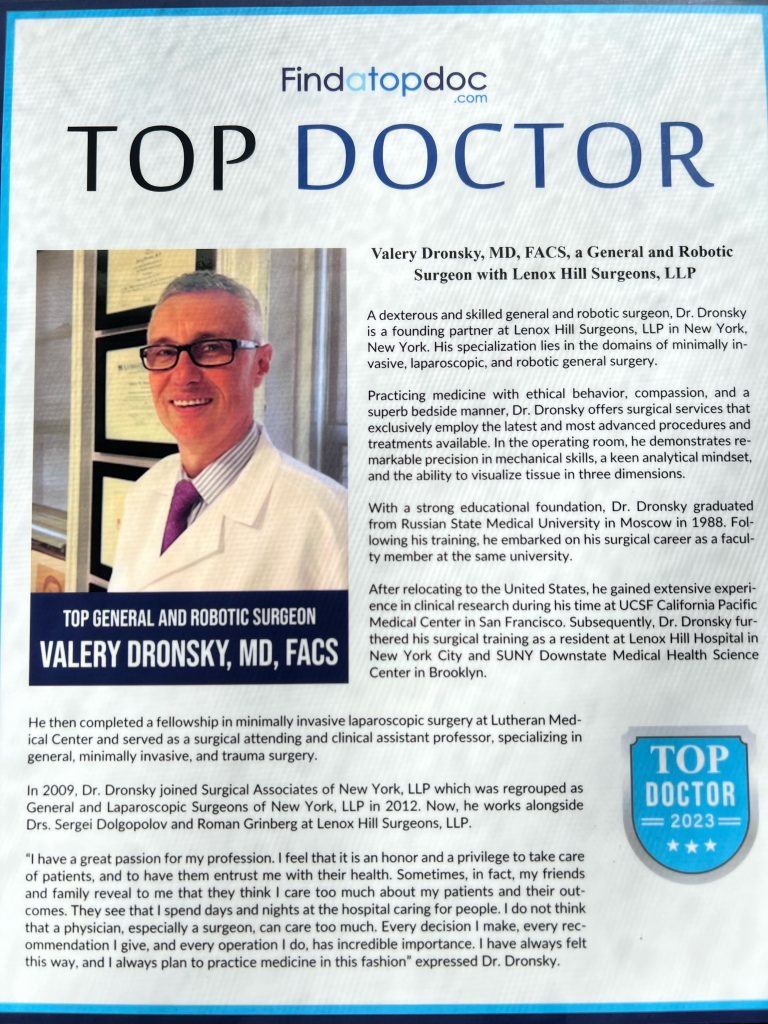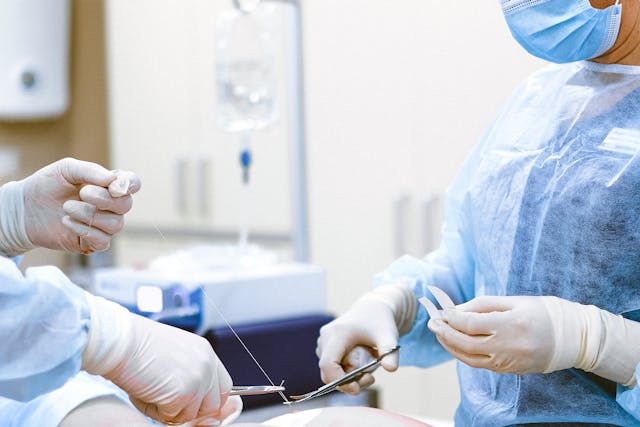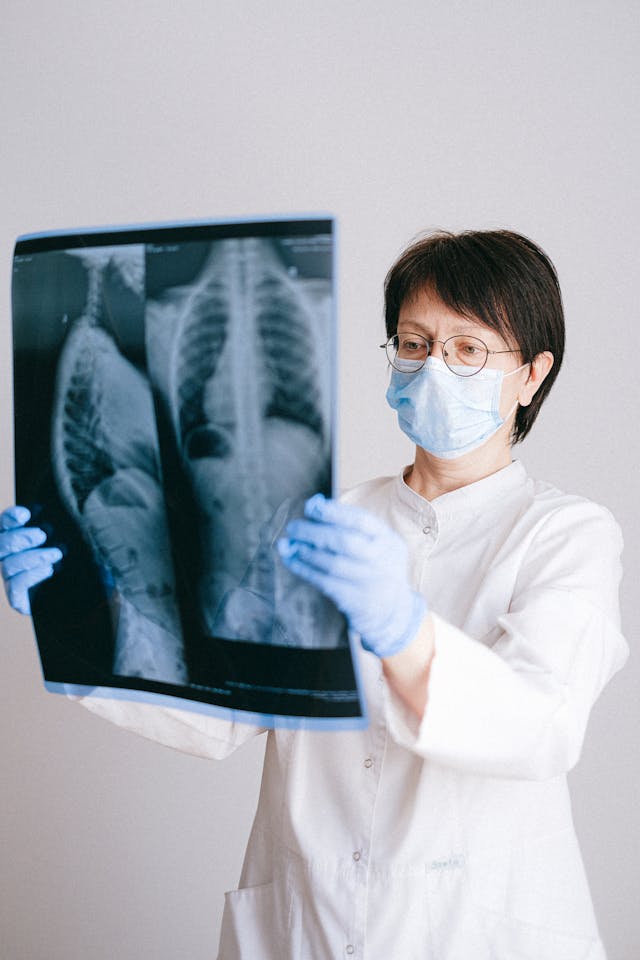CALL TODAY 646-846-1136 | EMAIL
Surgical Experts Dedicated to Improving Lives
At Lenox Hill Minimally Invasive Surgery PLLC, Dr. Valery Dronsky and his staff of medical professionals provide compassionate care with the highest ethical & professional standards. In our state of the art facility, we offer surgical services using only the most cutting edge and current procedures and treatments. We specialize in general surgery, including extensive experience in performing hernia repair surgery. Our expertise is in minimally invasive surgery and robotic surgery. Minimally invasive and robotic surgery often allow patients to experience easier recovery than traditional open surgery. They also allow for more precise and less traumatic surgery. When robotic and minimally invasive surgery is not an option, we are also skilled and experienced in traditional open surgical procedures.
Dr. Dronsky is an experienced and highly skilled surgeon having undergone extensive training in school, residency and fellowships. He practices medicine with ethical behavior, compassion and superb bedside manner. In the operating room he exhibits precision mechanical abilities, analytical thinking and the ability to visualize tissue in three dimensions. These innate and learned skills allow Dr. Dronsky to be one of the most dexterous and skilled professionals in New York City and the Country.
Call us: 646-846-1136
PATIENT TESTIMONIALS
Recent Awards
We are honored and deeply appreciative to have consistently received prestigious awards and recognition year after year, establishing us as one of New York’s foremost hospitals for a wide range of general surgeries, safety measures, specialized procedures, and overall excellence in healthcare. At Lenox Hill Minimally Invasive Surgery, our unwavering commitment lies in delivering exceptional care and unwavering support to our patients, guaranteeing their safety and successful recovery throughout their entire surgical experience.
Hospital Quality Awards
 America’s 50 Best Hospitals Award™ (2023, 2022)
America’s 50 Best Hospitals Award™ (2023, 2022)
Top 1% in the nation for providing the highest clinical quality year over year.

America’s 100 Best Hospitals Award™ (2021)
Top 2% in the nation for consistently delivering clinical quality year over year.

America’s 250 Best Hospitals Award™ (2023, 2022, 2021)
Top 5% in the nation for consistently delivering clinical quality.

Patient Safety Excellence Award™ (2023, 2022)
Top in the nation for providing excellence in patient safety by preventing infections, medical errors, and other preventable complications.
Specialty Clinical Quality Awards

America’s 100 Best Hospitals for Cardiac Care Award™ (2023, 2022, 2021, 2020, 2019)
Superior clinical outcomes in heart bypass surgery, coronary interventional procedures, heart attack treatment, heart failure treatment, and heart valve surgery.

America’s 100 Best Hospitals for Coronary Intervention Award™ (2023, 2022, 2021, 2020, 2019)
Superior clinical outcomes in coronary intervention procedures (angioplasty with stent).

America’s 100 Best Hospitals for Prostate Surgery Award™ (2023, 2022, 2021)
Superior clinical outcomes in prostate removal surgery and transurethral resection of the prostate.
Click to see all of our Healthgrades best doctors awards




Visit our main website at www.LenoxHillMinimallyInvasiveSurgery.com
Blog Posts are Below:
Category Archives: Cancer Treatment
The Role of General Surgery in Cancer Treatment: Latest Approaches
General surgery plays a vital role in the treatment of various types of cancer, often serving as the primary or first-line treatment for many solid tumors. With the rapid advancements in surgical techniques and technology, the field of general surgery has become increasingly effective in addressing cancerous growths, minimizing patient discomfort, and enhancing recovery. For those facing a cancer diagnosis, understanding the role of general surgery and the latest approaches available can empower patients and their families to make informed decisions.

This guide will explore how general surgery is used in cancer treatment, the latest surgical approaches, and the benefits of minimally invasive techniques.
Understanding the Role of General Surgery in Cancer Treatment
Surgery is often one of the primary treatments for cancer, particularly when the cancer is localized and has not spread to other parts of the body. Surgery can serve several purposes in the treatment of cancer:
- Curative Surgery: When the entire tumor can be removed, surgery may offer a potential cure for certain cancers. Curative surgery is most effective when cancer is detected early and remains localized.
- Debulking Surgery: In cases where removing the entire tumor is not possible or safe, debulking surgery may be performed to reduce the size of the tumor. This can help improve the effectiveness of other treatments, such as chemotherapy or radiation.
- Palliative Surgery: For advanced cancers, surgery may be used to relieve symptoms and improve the quality of life, even if the cancer itself cannot be cured.
- Preventive Surgery: For individuals at high risk of certain cancers, preventive (or prophylactic) surgery may be performed to remove tissue that is likely to become cancerous in the future.
The surgical approach depends on the type, stage, and location of cancer, as well as the overall health of the patient.
Latest Surgical Approaches in Cancer Treatment
With advances in technology and surgical techniques, the treatment of cancer has evolved significantly. Here are some of the latest and most effective approaches in surgical oncology:
1. Minimally Invasive Surgery (MIS)
Minimally invasive surgery, including laparoscopy and robotic-assisted surgery, has revolutionized the field of cancer surgery. Using small incisions, high-definition cameras, and precise instruments, surgeons can perform complex procedures with greater accuracy and less trauma to surrounding tissues.
- Laparoscopic Surgery: This technique uses a laparoscope, a thin tube with a camera, inserted through a small incision. The surgeon views a magnified image on a screen and operates through additional small incisions. Laparoscopic surgery is commonly used for cancers of the colon, stomach, liver, and pancreas.
- Robotic-Assisted Surgery: With robotic-assisted systems like the da Vinci Surgical System, surgeons can operate with enhanced dexterity and control. This is particularly beneficial for cancers in hard-to-reach areas, such as prostate or rectal cancer.
Benefits of Minimally Invasive Surgery:
- Smaller incisions and minimal scarring
- Reduced blood loss
- Shorter hospital stays
- Faster recovery times
- Lower risk of infection and complications
2. Sentinel Lymph Node Biopsy
In cancers such as breast cancer and melanoma, determining whether cancer has spread to the lymph nodes is essential for staging and treatment planning. A sentinel lymph node biopsy is a minimally invasive procedure that identifies the first lymph node to which cancer cells are likely to spread. By targeting only the sentinel node, this approach reduces the need for extensive lymph node removal, decreasing the risk of complications like lymphedema.
3. Radiofrequency Ablation (RFA) and Microwave Ablation (MWA)
For small tumors, especially in the liver, kidneys, and lungs, radiofrequency ablation (RFA) and microwave ablation (MWA) are effective alternatives to traditional surgery. These treatments use heat generated by radio waves or microwaves to destroy cancer cells. RFA and MWA are minimally invasive and can be performed using image guidance without large incisions.
4. Cryosurgery
Cryosurgery, also known as cryotherapy, uses extreme cold to destroy cancerous tissue. Liquid nitrogen or argon gas is applied directly to the tumor, freezing and killing the cancer cells. This technique is commonly used for prostate and skin cancers and offers a minimally invasive approach with minimal damage to surrounding tissue.
5. Hyperthermic Intraperitoneal Chemotherapy (HIPEC)
HIPEC is a specialized approach used in cases of abdominal cancer, such as colorectal or ovarian cancer, that has spread to the peritoneal cavity. During surgery, after removing visible tumors, heated chemotherapy is applied directly to the abdominal cavity. The heat enhances the effectiveness of the chemotherapy, and by applying it locally, higher doses can be used without systemic side effects. HIPEC is often referred to as “hot chemo” and is gaining popularity for its effectiveness in treating advanced abdominal cancers.
6. Endoscopic Surgery
Endoscopic surgery uses a flexible tube with a camera (endoscope) inserted through natural openings like the mouth or rectum to access the tumor. It’s especially useful for early-stage cancers of the digestive tract, such as esophageal or gastric cancer. Endoscopic procedures like endoscopic mucosal resection (EMR) and endoscopic submucosal dissection (ESD) allow for precise removal of tumors without the need for external incisions.
7. Oncoplastic Surgery
For breast cancer, oncoplastic surgery combines tumor removal with reconstructive techniques to preserve or restore the breast’s appearance. This approach allows for wider tissue removal, reducing the risk of recurrence while maintaining the cosmetic outcome. It is especially beneficial for patients who wish to maintain their natural breast contour after cancer surgery.
The Benefits of Modern Surgical Techniques for Cancer Patients
 Advances in general surgery for cancer treatment have introduced significant benefits that improve outcomes, reduce complications, and enhance the quality of life for patients:
Advances in general surgery for cancer treatment have introduced significant benefits that improve outcomes, reduce complications, and enhance the quality of life for patients:
- Reduced Pain and Trauma: Minimally invasive techniques cause less damage to surrounding tissues, leading to reduced pain and faster recovery.
- Improved Precision: Robotic and laparoscopic approaches allow surgeons to operate with precision, minimizing the risk of damaging healthy tissue.
- Shorter Recovery Times: With smaller incisions and less blood loss, patients often recover faster and spend less time in the hospital.
- Lower Risk of Infection: Minimally invasive techniques are associated with a lower risk of post-operative infections, promoting better healing.
The Role of Surgery in Multidisciplinary Cancer Treatment
While surgery is often essential for cancer treatment, it is rarely the only treatment. Cancer care is highly multidisciplinary, often involving combinations of surgery, chemotherapy, radiation therapy, immunotherapy, and targeted therapies. A multidisciplinary team of specialists—including surgical oncologists, medical oncologists, radiologists, and pathologists—work together to create a personalized treatment plan for each patient.
For some cancers, surgery may be the first step, followed by adjuvant (post-surgical) chemotherapy or radiation therapy to target any remaining cancer cells. In other cases, neoadjuvant (pre-surgical) therapies may be used to shrink the tumor, making it easier to remove surgically. The collaboration of various specialists ensures a comprehensive approach to treatment, maximizing the chances of a successful outcome.
Recovery and Follow-Up After Cancer Surgery
Recovery from cancer surgery varies depending on the type and complexity of the procedure. Minimally invasive surgeries typically offer faster recovery times, with patients able to resume normal activities within weeks. For more extensive surgeries, such as esophagectomy or liver resection, the recovery period may be longer, and patients may require additional support in the form of physical therapy and dietary guidance.
Post-surgery, regular follow-up appointments are crucial for monitoring recovery, detecting potential recurrences, and managing any side effects. Cancer patients are often placed on a follow-up plan involving periodic imaging studies, blood tests, and physical exams to ensure long-term health.
General Surgery in Cancer Treatment Conclusion: Advancing Cancer Care with Surgical Innovation
The field of general surgery continues to evolve, with new technologies and techniques improving the safety, effectiveness, and recovery times for cancer surgeries. From minimally invasive techniques and robotic-assisted surgery to innovative approaches like HIPEC and cryosurgery, patients now have more options than ever for effective, tailored cancer treatment.
If you or a loved one has been diagnosed with cancer and is considering surgery, consulting with a team of experienced surgeons specializing in cancer treatment can make all the difference in the journey to recovery. Contact Lenox Hill Minimally Invasive Surgery today to learn more about the latest surgical advancements and how our skilled surgeons can help in the fight against cancer.
Contact Information
LENOX HILL MINIMALLY INVASIVE SURGERY
117 E 77th Street
New York, NY 10075
646-846-1136
admin@lenoxmis.com
Visit our website for more information:
https://lenoxhillminimallyinvasivesurgery.com/















